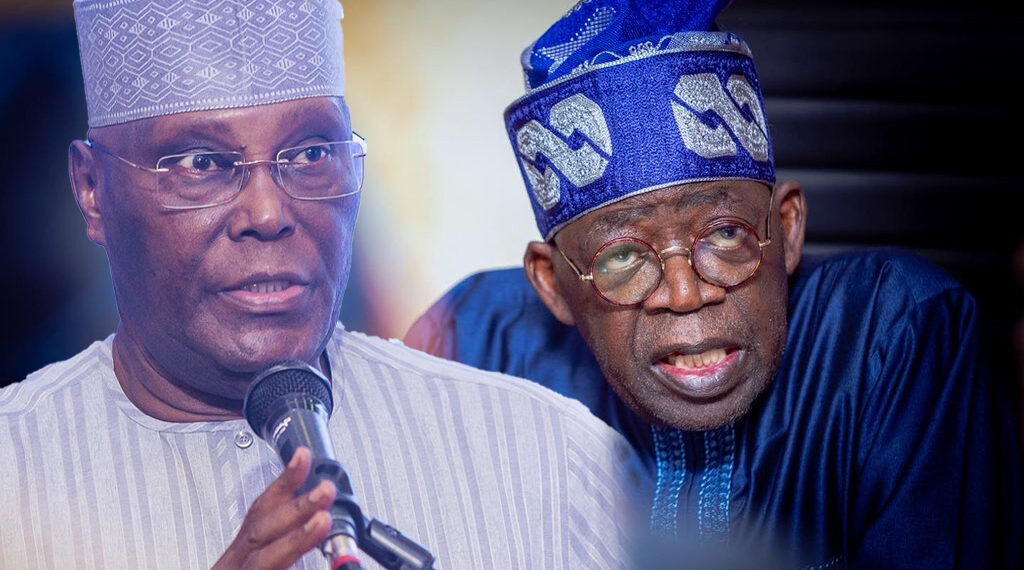Comments and Issues
Atiku goes for broke over Tinubu’s certificate saga
Published
7 months agoon

President Bola Tinubu – acclaimed cat (or bat) with nine lives – seems to face the last test of his staying political power, as former Vice President Atiku Abubakar moves to quash the judgment of the Presidential Election Petitions Court (PEPC), which’s affirmed him (Tinubu) as winner of the February 25, 2023, election.
Atiku, candidate of the Peoples Democratic Party (PDP), has filed 35 grounds of appeal at the Supreme Court, which’s 60 days to determine the matters, and hopefully close the 2023 presidential election cycle. Yet, as the final arbiter in election issues in Nigeria, the apex court can make a couple of orders that’ll take closure of the poll beyond the remaining 60-day window.
One, the court can order a re-run between the two leading candidates (Tinubu and Atiku) at the election, on the basis that Tinubu didn’t score the required majority of lawful votes, and secure 25% of the votes cast in not less than 24 states and the Federal Capital Territory (FCT), Abuja.
Two, the court can annull the election for a fresh exercise, on the ground that the February 25 poll – allegedly massively rigged amidst widespread violence – didn’t meet the threshold of freeness, fairness, credibility, transparency and acceptability.
Similarly, the Supreme Court can make a couple of orders that’ll end the presidential poll cycle. One, uphold the judgment of the PEPC, and thus the declaration by the Independent National Electoral Commission (INEC), which returned Tinubu as President.
Two, disqualify Tinubu from the February poll, mainly for failure to meet, or contravening the requirements to contesting in the poll, and declare Atiku, as first runner-up, as the President.
The PEPC, an Appeal Court, acted as the Election Petitions Tribunal for the presidential poll. It evaluated the consolidated petitions of the PDP, Labour Party and Allied Peoples Movement (APM) and their candidates, and dismissed them on September 6, for lack of merit, and affirmed Tinubu’s victory at the election.
Delivering the lead judgment in a 12-hour plus sitting, chairman of the five-member panel, Justice Haruna Tsammani, said: “This petition accordingly lacks merit. I affirm the return of Bola Ahmed Tinubu as the duly elected President of the Federal Republic of Nigeria.”
Though he accepted the PEPC ruling, Atiku’s dissatisfied with the court’s findings, and has appealed to the Supreme Court, regurgitating most of his pleadings the PEPC had mainly struck out.
Meanwhile, as he continues to face controversies, fueled by conspiracy theories, Tinubu, whose taciturnity appears to be his strategy for surviving a toxic political environment, opens his flanks for Atiku to query the Tribunal’s failure to properly consider the evidence he placed before it, particularly Tinubu’s academic records from Chicago State University (CSU) in Illinois, United States.
The controversies include: (1) That Tinubu forges his birth, education and job records, swears on oath, and commits perjury.
(2) He’s convicted for narcotics and money laundering, and forfeited $460,000 to the U.S. government.
(3) He’s dual citizenship: Nigeria and Guinea, in breach of provisions of the 1999 Constitution.
Related to the above, are that: (1) Tinubu’s running mate in the election, and now Vice President, Senator Kashim Shettima, was nominated for two elective positions, in violation of provisions of the Electoral Act 2022.
(2) INEC violated the Act, and its own regulations and guidelines by failing to electronically transmit the presidential results via the Bimodal Voter Accreditation System (BVAS) onto the INEC Results Viewing (IReV) portal, for real-time perusal by the electorate.
(3) Tinubu didn’t score the “mandatory” 25% votes cast in the FCT, Abuja, in addition to securing same in at least 24 of 36 states of the federation.
Atiku, who couldn’t prove allegations of electoral fraud “beyond all reasonable doubts,” alleges that Tinubu forged the certificate he presented to INEC in 2022, for the February poll, even as Tinubu denies same, and states that he attended CSU (1977-1979), with the school confirming it.
Consequently, Atiku, focusing on three crucial inter-related areas: Tinubu’s alleged identity theft; non-studentship at CSU; and forgery of the university’s certificate, subpoenaed, and deposed CSU, to produce and confirm Tinubu’s academic records on oath.
That’s the basis for CSU’s release of Tinubu’s academic records to Atiku on October 2, and deposition on October 3, in compliance with the order of Justice Nancy Maldonado of the U.S. Northern District Court of Illinois in Chicago, who’d upheld earlier order of Magistrate Judge Jeffrey Gilbert for the Northern District of Illinois.
In all, the CSU presented scores of documents to Atiku, in the order of his four main requests:
(1) “A true and correct copy of any diploma for a Bachelor of Science degree issued by CSU in 1979,” for which Atiku received seven (7) copies of diplomas CSU issued to seven former students in 1979.
(2) “A true and correct copy of any diploma issued by CSU to Tinubu,” with no documents produced for Atiku, as CSU maintains that it doesn’t keep copies of student diplomas, as they’re ceremonial.
(3) “True and correct copies of any diploma issued by CSU (other than Tinubu) that contains the same font, seal, signatures and wording as in the certificate that Tinubu submitted to INEC,” and Atiku received five (5) copies of diplomas, which match the format of the replacement diploma dated June 27, 1997, that CSU issued to Tinubu.
(4) “True and correct copies of any CSU documents relating to Tinubu that were certified by Jamar C. Orr, Esq., and all communications to or from CSU concerning the certification of such documents by Jamar C. Orr, Esq. between August 1, 2022 and August 1, 2023,” and Atiku received nineteen (19) documents relating to
Tinubu that were certified by Mr. Jamar Orr between August 1, 2022 and August 1, 2023, but CSU withheld the communications aspect of the request, going by prior ruling of the court.
So, the October 3 setting was to orally depose CSU, to confirm attendance of and authenticate the certificate it awarded to Tinubu in 1979, and a replacement diploma in 1997.
The venue was West Wacker Drive in Chicago, Illinois, and at the office of Angela Liu, one of the lawyers hired by Atiku, to help him establish a case of forgery of CSU’s certificate by Tinubu.
Present at the deposition were five other lawyers from the firm, Dechert LLP. Joining the session were Tinubu’s lawyers, Victor P. Henderson and Oluwole Afolabi (who joined by zoom from New York). Also in attendance were CSU’s lawyer, Michael Hayes, and its registrar, Caleb Westberg.
In the over five-hour deposition, Atiku’s lawyers’ quizzing to catch Westberg off-guard – to contradict himself or CSU – was to no avail. The school registrar stood his ground, and reaffirmed that Tinubu attended and graduated from CSU, and the certificate awarded to him in 1979, and a replacement diploma in 1997 were authentic, inclusive of the discrepancies, which resulted from changes made to CSU’s certificate format over the years, and human errors.
Now, armed with Tinubu’s academic records, the pursuit of which he describes as “bringing clarity and definitive answers to these issues that appear to have defied our institutions for nearly a quarter of a century,” Atiku will attempt to fortify his 35-point appeal at the Supreme Court, which may oblige filing of the fresh evidence (in line with Order 2 Rule 12(1) of the “Supreme Court Rules 1985” (as amended), but without giving any probative value to it.
Atiku, looking to address this fear at a World Press Conference in Abuja on October 5, obliquely implored the Supreme Court: “The issues at stake in this case require us once more to re-dedicate ourselves to both the country and our constitution. Now, we entrust these facts to us all as citizens and as leaders of the institutions (courts) charged with interpreting our constitution.”
He added: “It should not take months or, indeed, decades, for the institutions (courts) concerned to be able to do their work in establishing the credibility of any certificates presented by candidates for public office.”
Whatever his misgivings, Atiku must convince the Supreme Court: (1) Why he couldn’t obtain the new evidence (documents) to front-load with his petition at the PEPC, if it’s relevant to him. (Or “is it a case of becoming wiser after the event (the PEPC judgment),” as George A Oguntade JSC (as he then was) avers in UBA Plc v. BTL Ind. Ltd. (2005) 10 NWLR?) (2) That the fresh evidence will have an important, but not necessarily crucial effect on the whole case. (3) That the evidence is apparently credible, capable of being believed and it need not be incontrovertible.
So, will the Supreme Court admit Atiku’s new evidence, and open the floodgate for fresh materials at appeals? Won’t dubious applicants abuse the process, as Oguntade JSC (as he then was) cautions?
Nigerians can’t wait for the apex court, which’s “final not because it is infallible, but rather it is infallible because it is final,” according to Chukwudifu Oputa, JSC (as he then was)!
*Mr Ezomon, Journalist and Media Consultant, writes from Lagos, Nigeria .
Trending

 Health & Fitness4 days ago
Health & Fitness4 days agoMalaria Vaccines in Africa: Pastor Chris Oyakhilome and the BBC Attack

 Aviation6 days ago
Aviation6 days agoWhy some airlines are avoiding Nigeria’s airspace–NAMA

 Aviation5 days ago
Aviation5 days agoJust in: Dana airline crash lands in Lagos

 Aviation5 days ago
Aviation5 days agoNSIB begins investigation into Dana Air after crash-landing incident

 Aviation5 days ago
Aviation5 days agoJust In: Dana Air plane crash-lands in Lagos

 Aviation4 days ago
Aviation4 days agoJust in: FG suspends all Dana Air operations

 News1 week ago
News1 week agoOndo APC guber hopefuls reject primary poll

 Featured2 days ago
Featured2 days agoGov, Abiodun appoints Chess master, Onakoya sports ambassador

